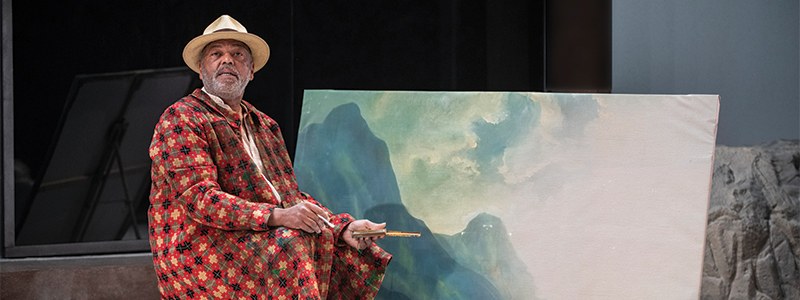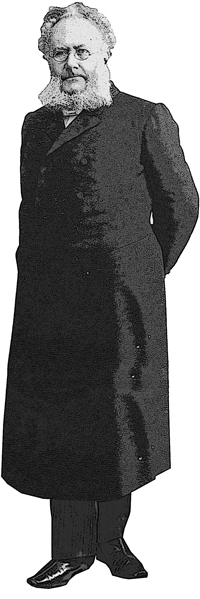In Conversation: Playwright Richard Nelson

In March 2020, when the pandemic shuttered Court’s production of The Lady from the Sea on the eve of its first preview performance, Artistic Director Charles Newell made a virtue out of the necessity of delay. He invited Tony Award-winning playwright Richard Nelson to undertake a new translation of Ibsen’s classic text. Here, Nelson shares his reflections on the art of translation and the reasons Ibsen’s work resonates with American audiences.
You were writing this translation during the pandemic. Did anything about the play resonate artistically while you were living in quarantine?
I don’t think so, and I’ll tell you why. For whatever reason, the time from March 2020 through the next sixteen months were probably the most productive writing time of my life. The amount I produced that I’m very proud of is huge. Part of that was Lady from the Sea, but there are many, many other things I did. I found myself happily, just happily focused on just my desk, and not on any other thing, during that time. I didn’t feel anything but the pleasure of just spending my time with my own work, and, in this case, which is the real value for me of these translations, the pleasure I felt was to spend time really close to a writer I greatly admire, Mr. Ibsen.
You have called Ibsen “the poet of everyday language.” Could you talk about what you aimed to achieve with this new translation?
First of all, Ibsen is a great humanist, and so always at the heart of his plays are not ideas, but characters. It is the human complexity that motivates him, and he is a great psychological thinker and writer. So that means, when doing a translation, you want to put people on the stage. You don’t want to put characters on the stage, you don’t want to put ideas on stage, you need to put people on the stage. An audience must feel comfortable that what’s in front of them are people behaving in a way that they, the audience, know people actually to behave. The translator’s goal is to have that comfort of people saying things on stage that seem like reasonably right, obvious, clear things to say, as opposed to saying things that are more arch or more formal. That’s where I begin. You want to feel that real people are in front of you.

Now on top of that, Ibsen is a poet. He uses imagery. So as a translator you want to find a way for that poetry to exist within the normal life, real life, or verisimilitude of life that is on the stage. It’s important to figure that out. I greatly admire Ibsen because he can make that leap—a leap which, as a writer, I try all the time to make in my own work but I don’t think without anything like his success—that leap of somehow thrusting a poetic situation, or a poetic character, into a story. Not just a poetic landscape—which he does in this play with the sea—but in terms of the Stranger. Bringing on a character like that who is so inexplicable—who forces an audience to wonder how much is real and how much is psychological—that’s a real gamble. That’s the exciting challenge of translating Ibsen—not just to recreate life, not just to make an audience feel that they are seeing life in front of themselves, but then to have that life be articulated or nuanced in a way to have a kind of poetry evolve and rise up as well. That’s the challenge.
Do you see translation as separate from playwriting, or is it the same act?
Well, it is not the same act, but it is not separate either. No, the two are very connected. Translating is a great way to learn playwriting, or a great way to continue to evolve your craft, because you are constantly—if you are translating Ibsen or Chekhov—dealing with extraordinary writers. And seeing how those writers do things is really helpful, I find, for my own work. When I did teach playwriting, I would always tell my students, when they were writing something, “Have you read this play, this play or this play? Because that would be helpful to you.” And also, it puts you as a playwright in a much greater tradition than just what’s happened in the last three years, but in a tradition going back three hundred years, or more. Translating is very useful, and it’s a fun change of pace, because unlike with a play, you are not faced with a blank page. The first draft of a play, every day you come to it, you don’t know what’s going to happen. You might have an outline, you might have lots of notes, but you just don’t know for sure where it will go. Whereas with translating, you might get a phone call in the middle of working on sentence, but you can take the call because the sentence will still be there when you get back. It’s all part of the writer’s life. There is craft involved in both playwriting and translating, but that craft is very, very similar.
Are your goals the same when translating and when writing a new play?
Absolutely. The goals for me in playwriting and in the plays I translate are character-based, character-centered, humanistic goals. Theatre is inherently made and built to put a live person in front of another live person. That’s the basis of all theatre. Theatre is the only artistic form that uses the entire live human being as its expression. It’s the only one that does this. We speak, we move, we are alive, and so the human being is the very heart and center of what a play is, what a theatre event is. And those plays that embrace the complexity of what it means to be a person, to be a human being on earth, are the plays that I think are the most interesting to me, and in the end, that are the greatest.
Why do Ibsen’s plays resonate so powerfully today?
We live in very ambiguous times right now, and Ibsen very much speaks to that. He is always trying to find the clashes between ideas, because for him no one idea is correct, it always has to be in conflict with another idea. He sets his plays within a societal framework, raising issues of how does one live in the society that we live in. In this play, he asks “What does it mean to be free?” Ellida wonders, “Do I matter? Is there a purpose to my life? Who am I?” These are the most existential questions we have in our lives. The struggle we see between Ellida and Wangel is an essential state of being for Ibsen. He makes the point that this is the world we are in—a world where people feel a lack of meaning, a lack of freedom, a lack of purpose. This is the way the world functions, he is saying, unless we fight it. And it’s a fight that has to keep continuing being fought, over and over and over again.
Is there a moment, a scene, or an element in this play that is precious to you as a writer?
If you look at how Chekhov and Ibsen, and Shakespeare too, how they begin their plays, you see their mastery of opening moments. In TheLady from the Sea, it’s like Ibsen had a little joke to himself. We see a guy untying something knotted in his hands, it’s a mess. He has a problem: “How am I going to untie this thing?”
What a wonderful, witty little way of saying, basically, we are going to be untying a problem in the next two hours. And then you have that flag that goes up. And you see how the putting up of the flag carries so much exposition—explaining who the characters are, who’s feeling what, what’s going on, how things are misunderstood. That flag is pretty brilliant. Just pretty darn brilliant. In terms of pure craft, my hat’s off.
Previews to Richard Nelson’s new translation of The Lady from the Sea begin February 25. Learn more →
Photo of Dexter Zellicoffer by Michael Brosilow.
2 responses on “In Conversation: Playwright Richard Nelson”
Comments are closed.
I would be very grateful if you could help me with Mr. Nelson’s email. I am a professor of English drama and interested in obtaining hi or the publisher’s permission to grant me in order to translate his (The Apple Family) into Arabic and, if permission granted, have it published. The translation is meant to help drama students be acquainted with the playwright and his works.
Thank you for any kind of help.
Best.
Prof. Salih M. Hameed
I would be very grateful if you could help me with Mr. Nelson’s email. I am a professor of English drama and interested in obtaining hi or the publisher’s permission to grant me in order to translate his (The Apple Family) into Arabic and, if permission granted, have it published. The translation is meant to help drama students be acquainted with the playwright and his works.
Thank you for any kind of help.